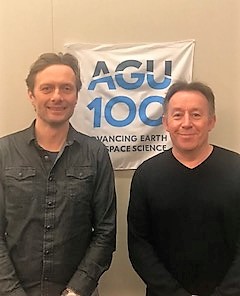Refine
Date Range Clear
Recorded by Clear
Keywords Clear
- Long Beach California 25
- Community 20
- Concordia 25
- Concordia College 25
- Concordia College Moorhead 25
- Brutal 25
- House Guests 25
- Court 25
- devestation 25
- W. Scott Olsen 25
- Mentor 8
- #AGU100 25
- #AGU 24
- discovery 12
- NASA 10
- changing planet 7
- #womeninscience 7
- Advice 5
- Collaboration 5
- data 4
- career path 3
- Climate 3
- 72 more
Partnerships Clear
- No matching terms.
Organizations Clear
- American Geophysical Union 5
- Ameican Geophysical Union 1
- American Geophsyical Union 1
- American Geopysical Union 1
- European Geophysical Union 1
- 3 more
Places Clear
Languages Clear
- No matching terms.
Initiatives Clear
- No matching terms.
James Butler has studied atmospheric chemistry, ozone depletion for over thirty years. Now, as the Director of NOAA’s global monitoring, he helps direct research into the hole in the ozone layer and climate change. He knows firsthand that we have...
Michael Freilich, Director of NASA's Earth Science Division, shares about his life studying the oceans and Earth as a system. While still in his high school's oceanography club, he started exploring a question about how waves move that later became...
Jack Kaye, associate director for research at NASA's Earth Science Division, discuss his origins as a chemist and earth scientist, and how he was recruited to Goddard to be a chemist among meteorologists. "My boss would advertise me as his...
Brian Day, of NASA’s Solar System Exploration Virtual Institute, leads a group of scientists in visualization and analysis of spacecraft data. Brian was taught that there’s no water on the moon, there’s no atmosphere on the moon, and the moon...
A conversation between student and professor, this discussion reveals the subtle dynamics between good friends, even when they outwardly seem to be very similar. Lee Slater met Andrew Binley when the former asked the latter for a job at Lancaster...
We won’t say how long Susan Lozier has been shaping young minds at Duke University (she may let it slip), but she talks about amazing changes that have happened during her tenure. She grew up wondering how rivers get polluted,...
Emily Schaller, project manager at NASA's National Suborbital Research Center at Ames, discusses her Ph.D. work studying the clouds on Titan and her work as a science and education. She recalled how as a young child, she would study illustrations...
Steven Pawson, Chief of the Global Modeling and Assimilation Office at NASA Goddard Space Flight Center, shares his experiences working on atmospheric and Earth systems science, including interactions between the Ozone Layer and climate change, and predicting air quality for...
Imagine this upbringing: only child, suburbs of Maryland, daughter of a mathematician and a pastry chef. If you guessed that child would achieve a management role with NASA’s famed IceBridge2 mission, congratulations, you truly have exceptional foresight. Linette Boisvert McPartland...
David Crisp, senior research scientist at NASA, recounted his adventures, from going from a physics education major who had a paper on Venus winds published by Carl Sagan to a doctoral student at Princeton to helping fix Hubble. He described...

!["I joined an Oceanography club & actually asked the question that ended up [being] my thesis." an interview with Michael Freilich](https://archive.storycorps.org/uploads/2019/02/181212_Freilich-450x450.jpg)







